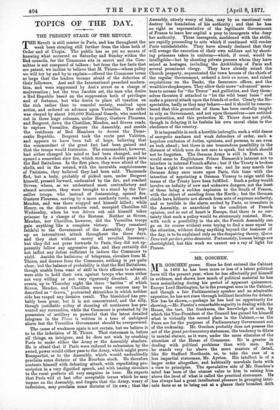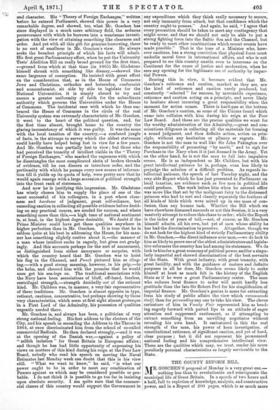MR. GOSCHEN.
GOSCHEN grows. Since he first entered the Cabinet 1.1'.1 in 1866 he has been more or less of a latent political force till the present year, when he has effectually put himself in evidence, and shown how much of political material he has. been assimilating during his period of apparent quiescence.. Except Lord Hartington, he is the youngest man in the Cabinet, and though a fair Parliamentary speaker and an admirable expositor, he has not risen through brilliant faculties for debate. Nor has he shown,—perhaps he has had no opportunity for showing,—Mr. Forster's remarkable sagacity in dealing with the. House, the tact, the frankness, the knowledge of men, by which the Vice-President of the Council has gained for himself what is virtually the second place in the Cabinet,—as the Peers are for the purposes of Parliamentary Government out of the reckoning. Mr. Goschen probably does not possess the art of the great parliamentary statesman, the tendency to dilate in mental stature, as it were, under the mere stimulus of the attention of the House of Commons. He is greater in dealing with political problems than with men. But he stands very far above the mere masters of detail, like Sir Stafford Northcote, or, to take the case of a less impartial statesman, Mr. Ayrton. His intellect is of a larger order altogether, and habitually marshals facts with a view to principles. The speculative side of Mr. Goscheu's mind has been of the utmost value to him in raising him above the level of what is called the practical statesman. He has always had a great intellectual pleasure in grouping intri- cate facts so as to bring out at a glance their broadest drift
and character. His " Theory of Foreign Exchanges," written before he entered Parliament, showed this power in a very remarkable degree, and showed, too, what Mr. Goschen has since displayed in a much more arbitrary field, the arduous perseverance with which he burrows into a wearisome investi- gation with the view of attaining something like clearness and order. And yet with all this gift for genuine burrowing, there is no sort of smallness in Mr. Goschen's view. He always seeks the broadest principle of which his facts will admit. His first great Parliamentary effort, when he put the University Tests' Abolition Bill on really broad ground for the first time, —ground from which at that time (in 1865) Mr. Gladstone himself shrank with something like dismay,—showed the same largeness of conception. He insisted with great effect en the consideration that, as in the House of Commons Jews and Christians, orthodox and heterodox, conformist and nonconformist, sit side by side to legislate for the National Universities, it is simply absurd to try and ensure a greater uniformity of faith for the subordinate authority which governs the Universities under the House of Commons. The incidental ease with which he thus em- braced the House of Commons in the circle of the real University system was extremely characteristic of Mr. Goschen, it went to the heart of the political question, and, for the first time almost, brought home to the country the glaring inconsistency of which it was guilty. It was the same with the local taxation of the country,—a confused jungle of facts, in the attempt to survey which the ablest statesman could hardly have helped being lost to view for a few years. And Mr. Goschen was partially lost to view ; but those who had perceived the tenacity of intellect visible in the " Theory of Foreign Exchanges," who marked the eagerness with which he disentangles the most complicated skein of broken threads of evidence, till he can discern or introduce order, and the pertinacity with which he pumps every new source of informa- tion till it yields up its quota of help, were pretty sure that he would' again emerge with a large accession of political strength into the front rank of statesmen.
And now he is justifying this impression. Mr. Gladstone has wisely chosen him to supply the place of one of the most successful of his colleagues, in a post where clear- ness and hardness of judgment, great self-reliance, but exceeding caution in collecting all possible evidence before decid- ing on any practical course, are needed for success, and where something more than this,—a high tone of national sentiment is, at least, in the highest degree desirable. We doubt if the Prime Minister could have got these qualities anywhere in higher perfection than in Mr. Goschen. It is true that he is seldom quite at his best in addressing the House, for his man- ner has something slightly costive about it,—the manner of a man whose intellect sucks in eagerly, but gives out grudg- ingly. And this accounts perhaps for the sort of amusement, as distinguished from either annoyance or surprise, with which the country heard that Mr. Goschen was to hoist this flag in the Channel, and Punch pictured him as cling- ing,—with a good strong meaning, however, in his grip,—to the helm, and cheered him with the promise that he would soon get his sea-legs on. The traditional associations with the Navy have been associations of bluff, off-hand, fearless, centrifugal strength,—strength decidedly not of the reticent kind. Mr. Childers was, in manner, a very fair representative of these traditions. Mr. Goschen is almost opposite in type, reticent, cautious, concentrative, but perhaps showing by these very characteristics, which seem at first sight almost grotesque in a First Lord of the Admiralty, his possession of qualities urgently needed there.
Mr. Goschen is, and always has been, a politician of very strong national feeling. His first address to the electors of the City, and his speech in seconding the Address to the Throne in 1864, at once discriminated him from the school of so-called commercial Radicals. He then declared strongly,—and it was at the opening of the Danish war,—against a policy of " selfish isolation " for Great Britain in European affairs ; and though he has had little opportunity of expressing his views on matters of this kind during his reign at the Poor Law Board, nobody who read his speech on moving the Naval Estimates last Monday week can doubt that this is his view still. " What we want to know," he said, " is what our power ought to be in order to meet any combination of Powers against us which may be considered possible or pro- bable. I do not think it is possible to go too far in insisting upon absolute security. I am quite sure that the commer- cial classes of this country would support the Government in
any expenditure which they think really necessary to secure, not only immunity from attack, but that confidence which the country ought to possess." And again, he said, " I agree that every precaution should be taken to meet any contingency that might occur, and that we should not only be able to put a strong fighting force into the Baltic Sea and the Channel, but be ready to meet other combinations which recent events have made possible." That is the tone of a Minister who, how- ever cautious, has a strong conviction that physical force must underlie moral force in international affairs, and who is not prepared to see this country unable even to intervene on the Continent for the cause of justice and moderation, when he sees any opening for the legitimate use of authority by impar- tial Powers.
Bearing this in view, it becomes evident that Mr. Goschen's reticence and caution, marked as they are, are the kind of reticence and caution rarely produced, but constantly "selected " for success, by mercantile experience, reticence and caution acting on a principle, and never likely to hesitate about incurring a great responsibility when the moment for action comes. There is hard-pan at the bottom of Mr. Goschen's caution, as some of the Unions found which came into collision with him during his reign at the Poor Law Board. And these are the precise qualities we want for the worthy administration of the Admiralty,—great and con- scientious diligence in collecting all the materials for forming a sound judgment, and then definite action, action on prin- ciple, without any hesitation or pliancy or regrets. Mr. Goschen is not the man to wail like Sir John Pakington over the responsibility of promoting " by merit," and to sigh for Purchase in the Navy when it is just doomed in the Army. Yet on the other hand, he is not the man to fall into impulsive errors. He is as independent as Mr. Childers, but with his great intellectual patience he is, perhaps, even less likely to prejudge the solution of a difficult problem. As regards in- tellectual patience, the speech of last Tuesday night, and the very able Report which he has just presented to Parliament on local taxation, are evidence such as few men in political life could produce. The work before him when he entered office was more like that set by the malignant fairy to the distressed princess who had to sort and classify separately the feathers of all kinds of birds which were mixed up in one mass of con- fusion, than any human task. Whether the Bill which we have elsewhere discussed succeeds or not this Session, it is a very masterly attempt to reduce this chaos to order; while the Report is the index of years of toil,—not, of course, as Mr. Goschen himself admits, all his own, but yet of men whose ability he has had the discrimination to perceive. Altogether, though we do not look for the highest kind of strictly Parliamentary ability in Mr. Goschen,—the direct influence over men,—we do look to him as likely to prove one of the ablest administrators and legisla- tive reformers the country has had among its statesmen. We do look to him for a great economy of political power, and for a singu- larly impartial and shrewd discrimination of the best servants of the State. With great industry, with great tenacity, with great lucidity, and with the guidance of mature and definite purposes in all he does, Mr. Goschen seems likely to make himself at least as much felt in the history of the English State as if he were a great Parliamentary orator. The man who reduces local finance to order will merit hardly less gratitude than the late Sir Robert Peel for his simplification of imperial finance. Mr. Goschen's genius is more for extracting from his study of public affairs the view which recommends itself, than for persuading any one to take his view. The clever caricature of him in Vanity Fair represented him as bend- ing eagerly forward with parted lips in an attitude of eager attention and suppressed excitement, as if attempting to extract something from an unwilling negotiator without revealing his own hand. It caricatured in this the real strength of the man, his power of keen investigation, of constitutional reticence, of significant caution, and yet of hard, clear purpose ; but it did not represent his pronounced national feeling and his comprehensive intellectual view. These are the qualities which may, we trust, render his more peculiarly personal characteristics so largely serviceable to the State.



































 Previous page
Previous page